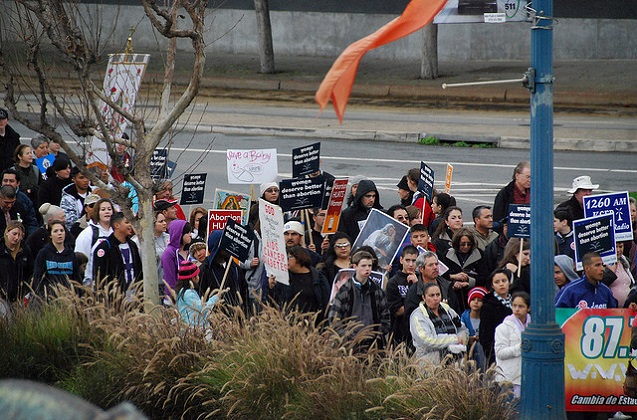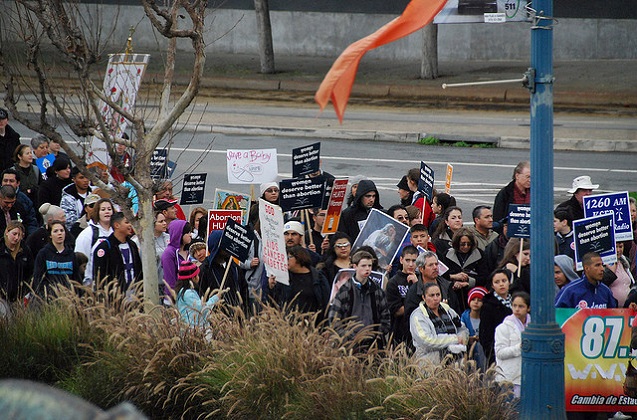
 Steve Rhodes / Flickr)” width=”637″ height=”420″ />Abortion protest in San Francisco. (Photo: Steve Rhodes / Flickr)
Steve Rhodes / Flickr)” width=”637″ height=”420″ />Abortion protest in San Francisco. (Photo: Steve Rhodes / Flickr)Dear Legislator:
I am a human shield.
I stand alongside patients so they can access their doctor’s office safely, without threats or shaming. I have seen things and heard things that would floor you, offend you and even terrify you on your city’s sidewalks. I volunteer gladly because accessing basic health care is a right in this country that I am willing to stand for until it is fully realized.
I do this work knowing that it is not my job. It is your job. Protecting your citizens, providing them basic safety and security on their city’s streets is at the core of the oath you swore when you took office.
I am not the police. I am not a lawmaker. I am just a neighbor, a friend, a compassionate face in a sea of picketers screaming hate and spewing bile at your constituents as they approach the door of a reproductive health care facility. Some seek cancer screenings, some seek to terminate a pregnancy, some seek prenatal care or birth control. Whatever their reason for visiting the clinic in your community, their safety and emotional well-being should be at the top of your priority list.
Perhaps you were not aware. Perhaps you have driven through the downtown area and seen signs but not stopped your car to hear the screaming or watched as patients and companions were chased to and from their cars. Perhaps you identify as “pro-life” and are uncomfortable facing the extremist behavior in your midst.
Today, I ask you not to look away. Today, I ask you to stand with me.
Buffer Zones and Public Safety
In cities and states across the country, conscientious legislators are enacting “Buffer Zones” and “Bubble Laws” to ensure the safety of their constituents. They have listened to letters and testimony from advocacy groups, patients and volunteers pleading for help. In many cases, they are seeking protection proactively before moderate harassment can become physical.
The Madison, Wisconsin and Englewood, New Jersey city councils have unanimously passed buffer protections in 2014. Englewood Councilman Michael Cohen spoke before the March 18 vote, acknowledging the “tension in this room” as testimony was heard.
Cohen stated that no matter a person’s position on abortion, they had to acknowledge that “no one should have to walk through this to get to the doctor.”
Life-long pro-choice activist and clinic escort Benita U. agrees with Cohen. “Whether you’re pro-choice or anti-choice, come on out and see what’s going on [at a clinic],” she said. “Put yourself in the shoes of a patient seeking medical care; see if that’s what you would want.”
To legislators concerned about infringing on the First Amendment rights of picketers, RH Reality Check Senior Legal Analyst Jessica Mason Pieklo has reassuring words: “Context with regard to the First Amendment always matters.”
Pieklo acknowledges that “any time the government regulates speech in any way, the Constitution is infringed.” However, those voicing their opposition aren’t the only people whose rights must be considered.
“Yes, people have the right to speak, but people also have a right to be left alone. This is the balance of the ‘buffer/bubble.’
I think, sadly, that most people kind of expect to see signs and prayers near abortion clinics, but that’s entirely different than having patients’ pictures taken, literature pushed in their hands, being approached individually and engaged.”
With the Massachusetts state buffer law before an unpredictable Supreme Court, there is widespread concern that the ruling could lead to additional lawsuits against cities and states with similar ordinances. Pieklo says she wouldn’t advise legislators to wait for the Supreme Court decision to draft protections, relying on the federal FACE [Freedom of Access to Clinic Entrances] Act in the meantime.
Attempting to intimidate budget-conscious local and state officials into avoiding lengthy, expensive legal battles is a long-standing anti-abortion movement strategy. “One of the goals of these kinds of legal challenges is to create uncertainty as a way to slow or stop legislatures from acting,” Pieklo says, adding that this leaves clinics vulnerable. “Buffer zones are designed to prevent violence, while the FACE Act is an attempt to remedy violence that’s already happened.”
Pieklo applauds Madison for moving forward on clinic protection:
“Madison is a great example of a city taking proactive, pro-woman rhetoric and enacting legislation. By contrast, lawmakers that deride single parenthood, families in poverty and healthy female sexuality and agency help breed cultures of violence against abortion patients and providers. These are absolutely linked in my mind.”
Culture of Violence
Pieklo isn’t citing some bygone era when abortion providers and clinic staff feared physical assault or even death. Dr. George Tiller was killed in 2009, and the provider who helped reopen a clinic in the same location wears a bulletproof vest to work. A clinic in Montana is attempting to rebuild after an attack in March devastated the facility, and the National Abortion Federation reports more than 300 incidents of assault, burglary, arson and threats just from 2010 through 2012.
I have seen dozens of clinic staff members – counselors, front-desk attendants, nurses – task family members with dropping them off at work so that their cars are not available for picketers to photograph, track and follow. Picketers record staff members and patients as they enter the clinics, often posting the videos on blogs and YouTube channels – with names when possible.
Benita finds this behavior familiar and unsettling. After Tiller’s murder, clinics were more interested in having escort groups present on sidewalks and near parking lots as an extension of their facilities. This changed her role from counter-protester to that of non-engagement, peaceful escort.
“As soon as we put vests on and became official clinic ambassadors, it got really nasty,” she says. “[The Pro Life Action League] tried to accuse us of slashing their tires. My address was everywhere; they tried to have us arrested. They accused me of whipping the crowd [outside clinics] into such a frenzy that we went to their homes and threw bricks through their windows.”
I’ve personally seen the behavior at several Chicago-area clinics where Benita organizes escort teams. I was spat on, chased into the street and had patients run to me for cover from aggressive picketers. Thanks to the modest buffer in Chicago, there are restrictions around clinic entrances, so I hadn’t seen a truly terrifying level of verbal abuse and physical intimidation until I arrived in New Jersey.
Escalation
Fringe groups like Abolish Human Abortion (AHA) – who picket at schools and churches they feel are not militant enough in opposing reproductive health care – regularly congregate in Englewood and across the New York state line in Queens. They scream at the top of their lungs, “preaching,” as they call it. Their bloody signs are shocking but can’t begin to compare to their racist, misogynistic, aggressive, rhetoric.
The AHA picketers go beyond the typical “Don’t kill your baby!” and “No, mommy, don’t do it!” reported by volunteers around the country. Personal slurs are leveled against escorts from inches behind them by physically imposing men. Picketers demand that companions “Be a man, dad!” and go back inside to “Save your child!” I watched them relentlessly chase after a husband that had tearfully confessed to them the story of his wife’s non-viable, but very much wanted pregnancy.
I have seen companions and patients nearly come to blows with picketers who refuse to stop screaming in their faces, videotaping them entering the clinic and proselytizing through violent imagery as they carry young children in their arms. These situations are a public safety hazards to the community at large and certainly do not resolve themselves without intervention.
Even the Pro Life Action League (PLAL) is returning to its roots, engaging again in the behavior Benita described by targeting me, pro-choice journalist Robin Marty and abortion provider Dr. Cheryl Chastine for the entirety of Lent this year. Everything about this campaign – which the Rev. Harry Knox, president and CEO of the Religious Coalition for Reproductive Choice, has called “hate in love’s clothing” – is an escalation over traditional “40 Days For Life” efforts.
Typically during Lent, activist evangelical churches and national anti-abortion groups put out the call for their members to pray for providers while expanding vigils outside clinics. Some groups, like the PLAL, attempt to provide a round-the-clock, daily presence outside certain facilities. For the most part, these seasonal protesters are a peaceful group that may catch patients off guard but don’t engage in aggressive behavior.
This year’s Lenten period, however, has proven to be tenser. The PLAL’s eagerness to publish names, faces and cities of not just providers, but media, has occurred alongside the heightened presence of AHA protesters around the country.
Benita says the AHA extremists definitely have shown up in Chicago. “I’m worried about [one of our clinics],” she said. “Their picketers remind me of those people who used to block doors.”
Legislators, Take Action
And so, I implore you, on behalf of your constituents and those who seek refuge and medical care within your city limits: Please be bold. Do not wait to be prompted by violence to ensure the safety of all.
Separation is not silence. This country has a long tradition of policing protests and partitioning protesters to maintain peaceable assembly.
This call to action is not radical or unprecedented. I’m not asking anyone to be arrested for having an opinion. No one has to shut up or sit down – just step aside. A reasonable distance could be 8 feet or could be across the street – just far enough for a patient’s individual health care needs and life choices not to be twisted into a political display or shaming exercise.
As Stephanie Toti, senior staff attorney at the Center for Reproductive Rights, explains, buffer zones are constitutional and necessary:
“Laws securing women’s safe passage into reproductive health care facilities are part of a long tradition of government action aimed at safeguarding the exercise of fundamental rights – like voting, going to school and attending religious services – from interference by third-parties. Just as buffer zones around polling locations protect voters from intimidation by political workers, buffer zones around reproductive health care facilities protect women from harassment, threats or violence by those opposed to reproductive rights. All levels of government have long recognized the importance of ensuring that individuals – in this case women and their reproductive health care providers – are able to exercise their fundamental rights without intimidation, obstruction or harassment.”
Reproductive health care, like any other human right, should be available without fear or impediment. It is within your power to provide this basic service. As more people wake up and put on escort vests, it will become increasingly uncomfortable for you to claim ignorance about the needs of your community. The time has come where voters will not consider you “pro-choice” simply for voting down harmful, unnecessary regulations; you must now be proactive in your stance for our rights and our safety.
As the rhetoric and the targeting of well-funded groups like the PLAL are bolstered by the activity of new, more aggressive groups like AHA, we need your assurance that our city’s sidewalks will not become a battleground.
Sincerely,
Katie Klabusich, clinic escort
We have 10 days to raise $50,000 — we’re counting on your support!
For those who care about justice, liberation and even the very survival of our species, we must remember our power to take action.
We won’t pretend it’s the only thing you can or should do, but one small step is to pitch in to support Truthout — as one of the last remaining truly independent, nonprofit, reader-funded news platforms, your gift will help keep the facts flowing freely.